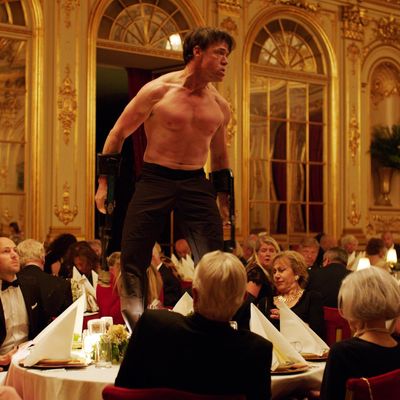
It’s helpful to think about Ruben Östlund’s meandering The Square as a museum, not unlike the one its protagonist runs. Östlund takes us through room after room of absurd, uncomfortable situations, provocations for us to either engage with or recoil from. Most of the film’s best scenes could function as their own short film; string enough of them together and they all shed different light on a central theme, though never quite fully articulating it. As with his last film, Force Majeure, Östlund is interested in ideas about social contracts, but the film also takes the time to explore power and class and, of course, the obliviousness of the art world.
Christian (Claes Bang) is a curator at a modern-art museum. While walking down the street, he protects a woman from what he thinks is an attack but turns out to be a setup for an elaborate pickpocketing scheme. This emotional seesaw of Christian, high on his own heroism, realizing he’s been taken advantage of, provides a kind of blueprint for the rest of the film. At first he sees the incident at a bemused remove, as if it were a kind of spontaneous performance he was lucky enough to witness, material for cocktail-party conversation. He and his assistant soon embark on an ill-advised mission to find the stolen phone and wallet, cruising around the city in a Tesla blasting Justice. Everything is a project.
At the same time, Christian is busy planning the opening of the titular art installation, a conceptual piece in which “everyone has equal rights and responsibilities.” We never see the artist, perhaps because Christian and his PR team take up so much oxygen that the art itself is an afterthought. Christian’s managerial neglect (he’s distracted by his vigilante mission, and also by getting into the pants of a journalist played by Elisabeth Moss) leads to a disastrous campaign and widespread outrage against him and the museum.
These little cycles and ironies dance around each other, and each successive scene toes the line between amusing and cringeworthy. At one point Christian, racked with guilt over a young boy who becomes collateral for his revenge scheme, records a video for the lad that slowly transforms from a sincere apology into a long-winded explanation of his acts — with art-crit buzzwords to boot. It subtly mirrors a bullshit-filled interview with Moss’s character at the beginning of the film, but this time the audience is a 10-year-old. The film’s pièce de résistance, though, is an extended scene at a donor dinner party at the museum, in which a performance artist roams the gilded hall, his act becoming more invasive and inappropriate while the black-tie crowd struggles to look the other way. Most of The Square elicits a chuckle or an embarrassed groan; here it becomes both impossible to watch and absolutely riveting.
The Square is sometimes haphazardly composed, especially over a two-and-a-half-hour runtime. Some loose ends are delightfully confounding, like Moss’s never-explained pet chimpanzee; some seem like they could have been wrapped up more gracefully. But Östlund’s eye for the subtleties of human behavior, especially public behavior, never fails. And by the end he finds at least one functional human interaction — at a cheerleading meet of all places, among armies of pigtailed girls hitting their marks and holding each other up. We overhear a coach giving a pep talk to a disappointed member of the squad. “Don’t waste energy feeling sorry for yourself,” he says with firm affection. “Correct it and move on.” Nobody else in The Square has the emotional maturity of a cheerleader.

